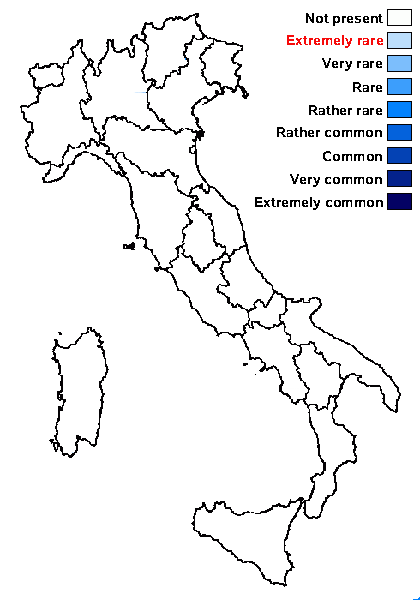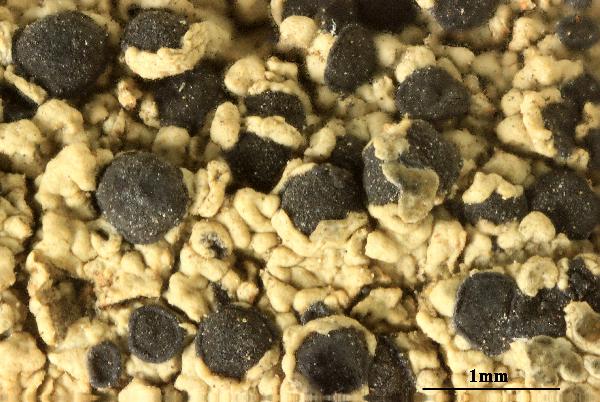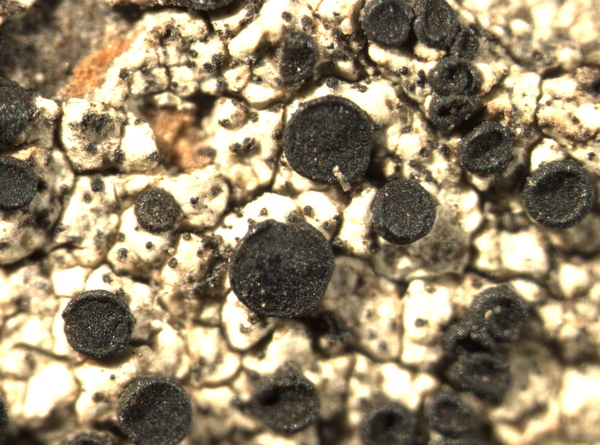Buellia sanguinolenta T.Schauer
Mitt. bot. Statss. München, 5: 620, 1965
Synonyms:
Distribution:
Description: Thallus crustose, thinly episubstratic, continuous or granulose, white-grey, sometimes delimited by a black prothallus. Medulla I-. Apothecia lecideine, black, sessile, (0.3-)0.4-0.6(-0.8) mm across, with a flat to convex, epruinose disc and a thin, persistent or finally excluded proper margin. Proper exciple 60-70 µm wide laterally, K-; epithecium brown; hymenium colourless, 120-140 μm high, inspersed with numerous oil droplets; paraphyses 1-1.5 μm thick at mid-level, the apical cells slightly swollen, 2-3.5(-4) μm wide. Asci 8-spored, clavate to cylindrical-clavate, the apical dome K/I+ dark blue with a pale, conical-pointed apical cushion (axial mass), the wall I-, but the thin outer gel I+ blue, Bacidia-type. Ascospores 1-septate (a few of them rarely 3-septate), brown, often curved, (21-)26-32-(35) x (11-)12-13(-16) µm, Callispora-type, paler at the pointed apices; the inner wall thickened subapically and at septum, the ontogeny of type C (subapical inner wall thickenings produced before septum formation). Pycnidia usually rare, black. Conidia ellipsoid-cylindrical, 3.5-4 x 1-1.5 μm. Photobiont chlorococcoid. Spot tests: thallus K+ yellow turning red (needle-like crystals), C-, KC-, P+ yellow-orange, UV-. Chemistry: atranorin (traces), norstictic and connorstictic acids. Note: a suboceanic species, also known from montane Fagus-Abies forests in Austria; to be looked for in the Italian Alps.
Growth form: Crustose
Substrata: bark
Photobiont: green algae other than Trentepohlia
Reproductive strategy: mainly sexual
Most common in areas with a humid-warm climate (e.g. most of Tyrrenian Italy)

Predictive model


Felix Schumm - CC BY-SA 4.0
[VZR490], Insulae Canarienses, insula Tenerife. Los Cristianos, in
valle San Lorenzo, loco Mirador de la Centinela dicto, 500 m. Ad
corticem Euphorbiae sp. Leg. A. Vezda, 10.03.1994, det. A. Vezda. EX
A. VEZDA: LICHENES RARIORES EXSICCATI NR. 490.
Growth form: Crustose
Substrata: bark
Photobiont: green algae other than Trentepohlia
Reproductive strategy: mainly sexual
Most common in areas with a humid-warm climate (e.g. most of Tyrrenian Italy)

Predictive model


 INDEX FUNGORUM
INDEX FUNGORUM
 GBIF
GBIF



